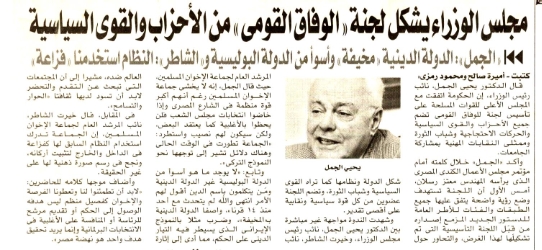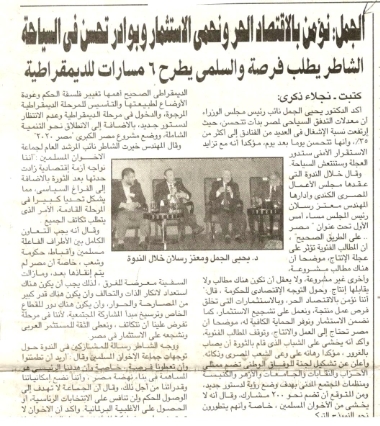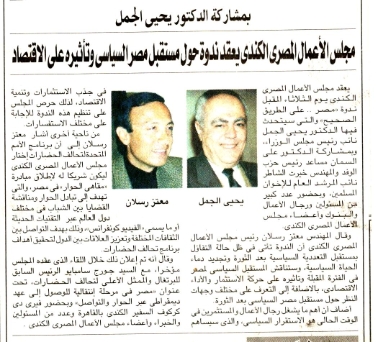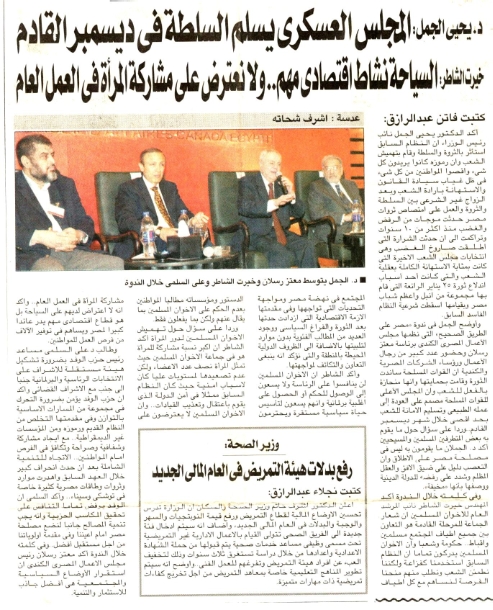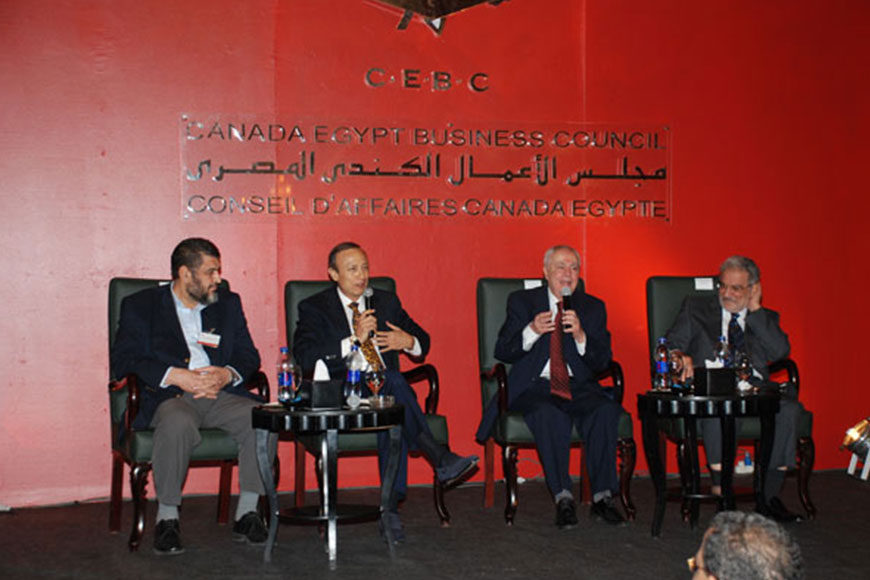
Date
Speaker(s)
Designation
Description
The Canada Egypt Business Council (CEBC) hosted a special event and panel discussion featuring prominent constitutionalist and Deputy Prime Minister, Dr. Yehia El Gamal, Eng. Khairat Al Shater, Deputy Chairman, Muslim Brotherhood, and Deputy Chairman of the Wafd Party, Dr. Ali El Salmi.
The event was arranged in the wake of the state of optimism for the future of the political pluralism through the new practice of renewing the blood of the Egyptian political atmosphere. The discussions shed the light on the future of Egypt’s policy in the coming period, the challenges ahead, the need for the development of a political strategy to restore Egypt’s position, as well as addressing the domestic political repercussions of the corruption that faced Egypt for quite a long time.
Over 250 prominent attendees from ministers, ambassadors, CEBC members and guests attended the event, among which were the head of the Administrative Prosecution Authority Dr. Taimour Kamel, H.E. Mostafa El Saiid, H.E. Ali-Moselhy, H.E. Dr. Hany Helal, H.E. Dr. Ahmed Darwish and other prominent figures from the political and the business sectors.
CEBC Chairman, Mr. Motaz Raslan delivered the opening remarks for the discussion. In his remarks, he outlined the drastic changes the Egyptian political landscape is witnessing since the January 25th revolution. He also expressed the urgent need to obtain clear agendas from the different political factions concerning the political and economic future of the country. Raslan went on to point out that for a businessman, political stability is a far more important concern than economic stability. Raslan concluded describing today’s political arena as “still vague and requiring interpretation”, asking the esteemed speakers, as representatives of the dominant political powers in Egypt, to pinpoint that in their speeches.
Constitutionalist and Deputy Prime Minister Dr. Yehia El Gamal then assumed the floor, and prefaced his speech by stressing on the national need to learn to communicate and to tolerate others’ differences. El Gamal highlighted several incidents and conditions that led to the current situation. He spoke of the scandalous parliamentary elections of November 2010 as being “the straw that broke the camel’s back” and the spark that eventually launched the revolution. He added saying, “Those in charge and the resources they controlled were no longer dedicated to serving the people, but rather to serving themselves and prolonging their stay in power”.
About the January 25th revolution he commented, “A glorious revolution initiated by noble young men and women, which resulted in stripping the former regime of any legitimacy and relevance”.
El Gamal praised the popular awakening that resulted after the revolution, pointing out the stark difference in the number of citizens going to the polls between the previous fraudulent parliamentary elections and the constitutional amendments referendum. Describing the current situation, he said that the streets are becoming safer and that tourism has started recovering. On the other hand, he blamed certain factions who have been protesting restlessly and insisting that their demands be met immediately. He explained that their demands are legitimate, however the way presented is unreasonable and hindering the production process that is essential for Egypt’s recovery from the economic halt.
Moving on to today’s political powers, El Gamal refuted the popular belief that the Muslim Brotherhood is the dominant political power today. He said that it is the most organized, yet in no way is followed by the majority of Egyptians. “I am not afraid of the Muslim Brotherhood. They are evolving towards the Turkish example appearing to be seeking a civil state built on the principles of Islam”. Commented El Gamal.
Upon answering a question on the national dialogue and the new constitution, Dr. El Gamal, announced that a National Consensus Committee of 150 to 200 participants will be formed. Participants in the committee will be chosen by the civil society and not by the government, the invitations will be sent shortly to all factions to participate in the dialogue. The committee will discuss national issues and will have the chance to draft a suggested constitution to be submitted to the Founding Assembly that will be responsible for drafting the new Egyptian constitution.
In his speech, Dr. El Gamal, gave his opinion about the situation in the governorate of Qena and the demonstrations and protests against the new governor, forcing him to resign, as a dangerous scene, especially with the threat of the increase of likelihood of similar events in other provinces, “this will destroy all the attempts of restoring security and stability in Egypt” emphasized Dr. El Gamal.
El Gamal ended his speech by denouncing religious extremism and calling for national unity and tolerance as the only way to a better tomorrow for Egypt and the Egyptians.
Dr. Ali El Salmi then took the floor, in his speech he stressed on two main points; what lies ahead? and where does Al Wafd party stand in the current political landscape?
He explained the future of the country in terms of how it arrived to its current status. “El Tahrir square was the climax, the years of struggle and suppressed dissent that led to it”. He sees that Egypt now seeks a democratic, modern, civil state, where people and law are sovereign and education is the foundation. He added that principles of political diversity, social justice and international independence are what Al Wafd Party is aiming for in the new Egypt. Achieving the aforementioned will only take place, when development on various fronts takes place simultaneously. He elaborated saying that rebuilding Egypt will neither happen overnight, nor by a single political faction. He explained that the old regime is still standing and efforts to bring it down should not cease. He explained saying that the extreme centralist policies still exist alongside other wrong practices related to the old regime. He named security as one quintessential area to be developed and recreated, adding that most popular unrest and demonstrations are a result of a lack of vision. “The issues that these factions demonstrate against can be dealt with by those in charge swiftly, if they are addressed properly.” he added.
El Salmi called for a democratic culture that extends to all institutions. He said that the deans and presidents of universities for example should be chosen through democratic elections. He also stressed on the need to move forward in economic development and to utilize many of Egypt’s formerly neglected riches such as Sinai and solar energy.
“There is no room for competition except for the betterment of Egypt,” was his concluding statement before leaving the floor to Eng. Khayrat El Shater.
El Shater, spoke of the challenges that are ahead of Egypt today, the role of the different political factions and finally of the Muslim Brotherhood and their political agenda.
He said that the economic crisis and the political vacuum are the main challenges facing Egypt after the revolution. He added to these two challenges the “political blockage” and “legacy of corruption” that the former regime has left behind. He justified the widespread dissent in many institutions as a result of the institutions’ corrupt nature. “Those in authority were taking advantage of the people’s resources leaving both Muslims and Christians deprived and in need”.
He also alluded to the challenge that Egypt faces due to unrest on its international borders. “Neither the government, nor a single political faction can face these challenges alone, our motto in this coming period should be to cooperate and to ally with one another for Egypt”. He criticized that the government is not involving other political factions in the decision-making process adding that the dialogue is necessary during this phase.
El Shater stipulated that encouraging businessmen to come back and invest in Egypt is of great importance. In addition, he pointed out that the Egyptian economy is one with little value added and that in this coming period this should change.
Upon a question posted regarding the Muslim Brotherhood’s agenda, he sees that the Egyptian people should give the Muslim Brotherhood a chance to prove that they are not what the fallen regime has always portrayed them to be as fundamentalists seeking a theocracy. El Shater said that they are indeed the most organized political faction and that they shall dedicate all their resources for the betterment of Egypt. He concluded his speech saying that the Muslim Brotherhood do not seek power, and will not be competing in the presidential race and that their only motive is to serve Egypt out of their devout religiosity.
The floor was then opened to questions asked by the audience. Questions covered concerns about the future of Egypt and having to re-elect a parliament after the new constitution is legislated, the relationship between the Justice and Development party and the Muslim Brotherhood, and the role of women in the business community according to the Brotherhood as well as their notion with regards to different issues among which were, tourism and the participation of Christians in the political arena. Furthermore, many questions voiced true concern at the Muslim Brotherhood’s aspirations to form a religious state despite their claims that they do not seek power.
This event was the second in a series of events aimed at addressing economic and political issues pertaining to Egypt after the revolution. It confronted many fears and concerns about the new political landscape and shed light on what seems to be a rather vague political transformation of Egypt.


